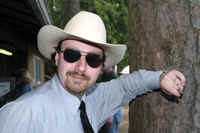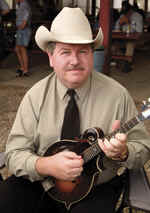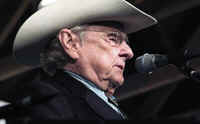Dr.
Ralph Stanley
Prescribing
bluegrass for more than half a century.
by Audrey
Hingley, Contributing Writer
Dr. Ralph Stanley sits at a table on a warm day in
central Virginia, surrounded by stacks of CDs for sale. Dressed in a
blue-striped shirt and gray jacket, Stanley looks like the quintessential
Virginia gentleman. Stylish, pointy-toed black boots are the only hint of
the persona he will assume onstage at the Central Virginia Family Bluegrass
Music Festival.
For the past 26 years, the festival at Amelia Family
Campground in Amelia, Va., has showcased famous and lesser-known luminaries
in the bluegrass world. And in this world, there is no bigger star than Dr.
Ralph Stanley.
Unlike rock stars shielded from admirers by a cadre of
security, Stanley graciously accommodates fans of all ages milling around
his table. Totally lacking pretense, he poses patiently for pictures and
autographs guitars. The only visible sign of success is the diamond ring he
sports and a gleaming turquoise tour bus parked nearby, �Ralph Stanley�
emblazoned neatly on its side.
|

Ralph
Stanley II - "Two" |
On this trip he�s just along for the ride, on the way
back from concert dates to his home in Dickenson County, Va. His youngest
son, Ralph Stanley II (known as �Two�) and The Clinch Mountain Boys are
the featured stars on the bill, though the elder Stanley will join them
during their evening set as a �surprise guest.�
Now 78, Stanley has been performing professionally
since he and his older brother, Carter, formed a band in 1946. Between 1946
and 1966, when Carter died, The Stanley Brothers and The Clinch Mountain
Boys became one of the most celebrated bluegrass groups in the world. After
Carter�s death, Ralph shifted to an older, less-adorned style of
traditional bluegrass he calls �old-time mountain music.� An expert
banjo picker, Stanley�s a cappella tunes were honed in the Primitive
Baptist Church of his youth, where services do not include musical
instruments.
�I�ve always liked to sing songs without music and
I still do. I sang in church a cappella. Although the members don�t
believe in it in the church, they buy every CD I make and take them home and
play them,� he says with a laugh.
Although long revered by fans, it wasn�t until 2000
� after nearly 200 albums, critical acclaim, countless road miles and 54
years of performing � that Stanley hit the big time, courtesy of a movie
starring George Clooney called O Brother, Where Art Thou. The film�s
soundtrack skyrocketed, selling over six million copies. In 2002 at age 75,
Stanley won his first Grammy Award for �Album of the Year� (for his part
in the O Brother recording) and �Best Male Country Vocalist,� besting
nominees like country hunk Tim McGraw. A documentary film, The Ralph Stanley
Story, also was released.
Of the �Best Male Country Vocalist� honor, Stanley
says, �I was a little surprised, but that was the one I really hoped to
win. It just felt so good I can�t hardly tell you.�
Stanley�s now-signature song, �O Death,� a
traditional tune that he sang in O Brother, features his high reedy tenor,
unadorned, forlorn, a cappella. As one writer opined, �Listening to
Stanley beg the Grim Reaper for another year in �O Death� sends chills
through anyone with a pulse.�
The last five years have boosted Stanley�s career
incredibly. What kept him going all those years when it wasn�t all gravy
and Grammys?
�Well, that�s true � but there was enough gravy
to keep going,� Stanley says with a chuckle, in a voice rich with
Appalachian resonance. �After the O Brother soundtrack, that opened it up
and gave me a chance to get out and see more folks, and have more folks come
and hear me. It gave me a different audience. I was in all the big papers,
like The New York Times, all through the years because they knew my music,
but after [the film] more people noticed it, and it just really exploded.�
|

Clinch
Mountain Boys lead guitarist James Shelton: "Since I was 14
years old, I wanted to play lead guitar for Ralph Stanley. This is
what I prepared for my whole life." |
Clinch Mountain Boys lead guitarist James Shelton,
originally from Gate City, Va., says the band is playing bigger, better
venues in the wake of Stanley�s fame.
�We�re not running ourselves to death playing like
we used to � Ralph is able to get more money and play less, which is
ideal,� Shelton explains. �But the main thing, to me, is the fact that
he finally got the recognition he deserved all those years � now the whole
world knows [his music].�
Shelton, a guitar virtuoso who has recorded eight solo
albums, was an avid fan before joining Stanley�s band. He calls playing
with his hero �a dream come true.�
�Since I was 14 years old, I wanted to play lead
guitar for Ralph Stanley. This is what I prepared for my whole life. I�ve
been here 11 years and I love it,� he says.
Dickenson County, where Stanley grew up, is one county
removed from where Virginia, Kentucky and West Virginia come together.
Ralph�s mother Lucy operated a small grocery, father Lee worked at a
sawmill and both parents sang in church. His mother taught Ralph to play the
banjo, while Carter learned guitar chords from the local mailman.
Stanley describes his growing-up years in the 1930s
succinctly: �I was just a poor boy back in the hills of southwestern
Virginia, just like any other people. I walked about three miles each way to
school, most of the time I walked barefooted. In the wintertime, the days
were short and I was hardly ever home during daylight � I was just a
country boy.�
Following military service, The Stanley Brothers were
soon performing live at a Bristol radio station with their newly dubbed
Clinch Mountain Boys. In 1947 they signed with Columbia Records, with their
debut album released in 1949. Grueling tours and a numbing cycle of live
performances on radio and in concert halls followed.
|

"This
old-time mountain music is what God gave me. He put in in my heart
and I can't get it out," says Stanley. |
Today Stanley could live anywhere, but remains in the
area where he was born. He says, �I like Virginia, I like where I was born
and raised, so I don�t see any reason for leaving home unless I have to
work.�
What does he remember about falling in love with music?
Why does he stay with this music?
�This type music that I do was the only thing I could
do. This old-time mountain music is what God gave me. He put it in my heart
and I can�t get it out,� he says simply. �It was born in me, that
passion for it. I wouldn�t do any other kind of music if I could. I call
it traditional bluegrass, old-time country music. I play the old-time way,
and I sing a lot of gospel in my shows, I play instrumentals, I sing love
songs. I just put on a show that�s suitable for the entire family.�
Stanley�s latest CD, Shine On, is a gospel project.
He sings lead on 12 of the 14 tracks. The CD gets off to a toe-tapping start
with a recent composition called �King Of All Kings,� and also includes
familiar favorites. One song, �Swing Low, Sweet Chariot,� was sung by
bluegrass legend Bill Monroe at Carter Stanley�s funeral in 1966, and by
Ralph 30 years later at Monroe�s funeral.
�Lots of times people send me songs, and when I hear
a song, like it and think I can do it, I am ready to record it. There�s a
lot of good songs that don�t suit me. I can tell the ones I like and think
I can do justice to. I�ve written songs, but not here lately. I like
songwriting, when it hits me, [but] I have to be inspired,� Stanley
explains. �I�m not like those guys in Nashville who go in and write 9 to
5 � they�re professional. I�m not a professional songwriter.�
Although he�s performed numerous times on the Grand
Ole Opry, Stanley was not inducted as a member until 2000. He notes,
�I�m very proud to be an Opry member, I think any entertainer would be
proud of that. You�re going out to millions of people on a show that�s
been going on for years and years and years. It gives you some prestige.�
Stanley has a slew of awards, including the Living
Legend award from the Library of Congress. He was the first recipient of the
Traditional American Music award from the National Endowment for the
Humanities and has an honorary doctorate in music, conferred on him in 1976
by Lincoln Memorial University. Recently he was made a lifetime member of
the Country Music Association, an honor Shelton hopes will help propel
Stanley toward induction into the Country Music Hall of Fame.
Married to wife Jimmi, he�s the father of three grown
children, Lisa, Tonya and Ralph II. Twelve-year-old grandson Nathan is
already playing mandolin onstage with the band. When the busy Stanley is not
on the road, what�s a typical day at home like?
�I just ride around � I have a little farm. I look
over my farm and I garden in the summer. I like gardening. I like green
beans, corn, tomatoes, cucumbers � there is nothing like your own
garden,� he explains. In a testament to family, Stanley says his garden is
still grown from seedlings originally planted by his mother.
He also enjoys �going over to the museum� � that
would be The Ralph Stanley Museum & Traditional Mountain Music Center in
Clintwood, the county seat. Opened last year, the $2 million project is
linked to Virginia�s �The Crooked Road,� a promotional effort that
focuses on musical contributions in southwest Virginia. The museum tells the
Stanley story via flat-panel video displays, vintage performance footage and
memorabilia displays. There�s a memorial to Carter, and a section devoted
to Ralph�s annual bluegrass festival, attracting thousands every Memorial
Day weekend for 35 years at Hills of Home Park.
�The museum is something I never dreamed of,�
Stanley admits. �When it happened, well, it�s the greatest thing I have
accomplished since I have been in music, in 59 years.�
Later that evening, Stanley is dapper onstage in dark
sport coat, western tie and white cowboy hat. Surrounded by his band, he
stands stiffly, hands clasped in front of the microphone, and demonstrates
with his haunting voice what all the fuss is about.
In an �American Idol� world of instant stars and 15
minutes of fame, he embodies the same qualities as his music: endurance,
faith, timelessness.
Another crowd roars its approval, and Dr. Ralph Stanley
smiles.
FOR MORE INFORMATION
Ralph Stanley Museum & Traditional Mountain Music
Center
Telephone: (276) 926-5591